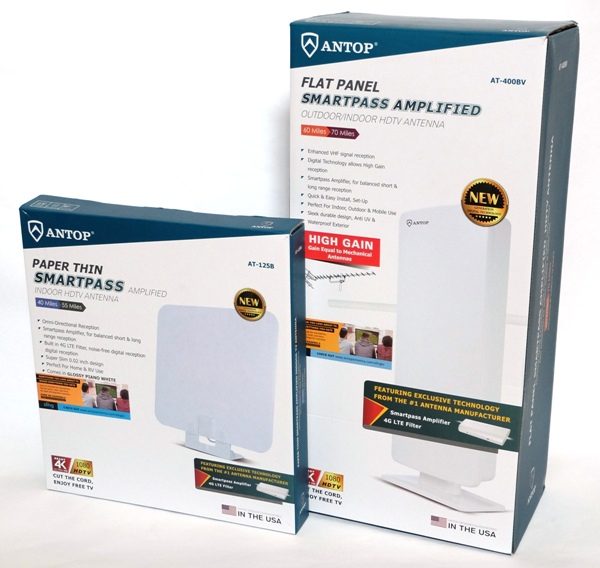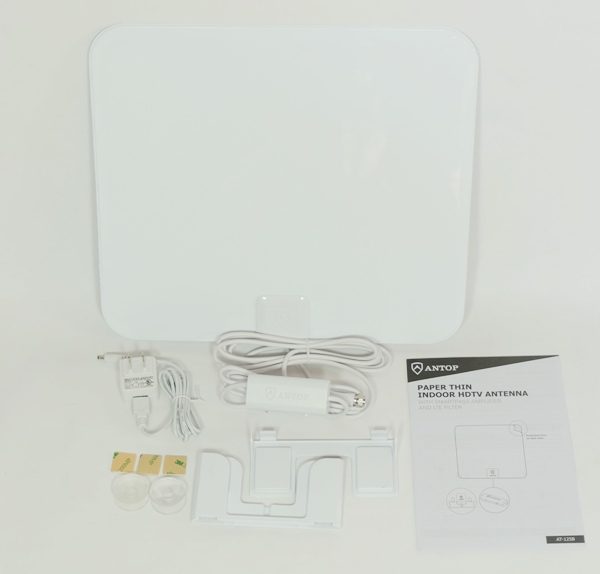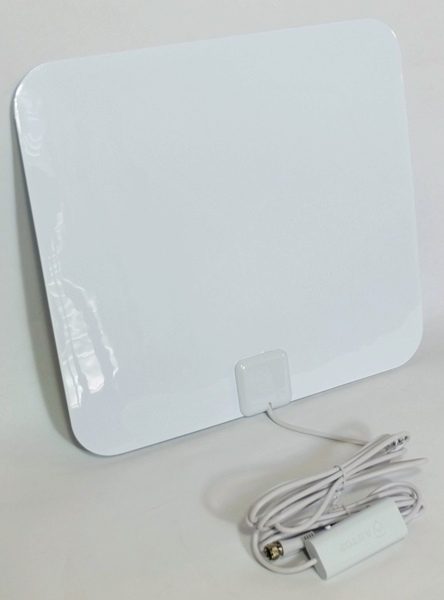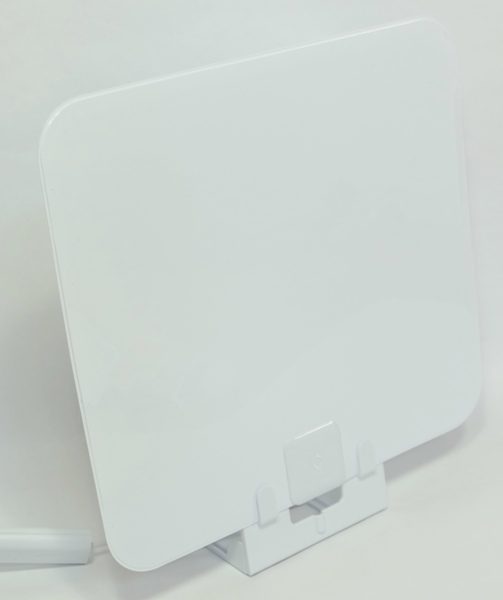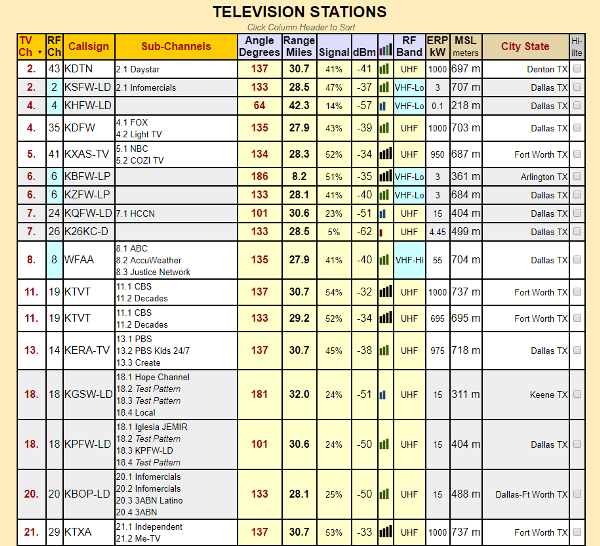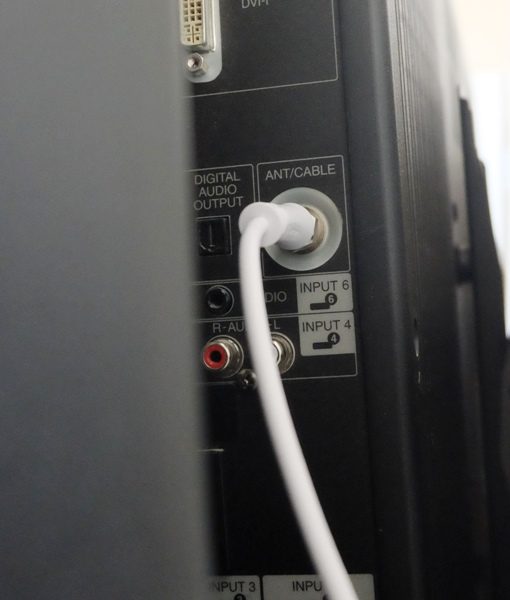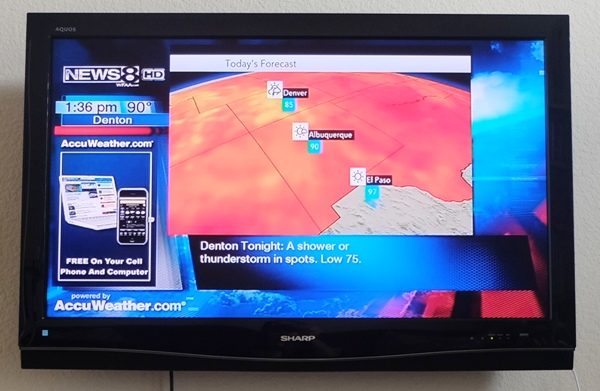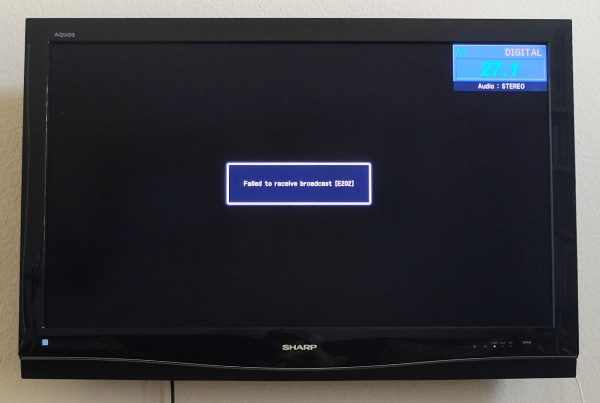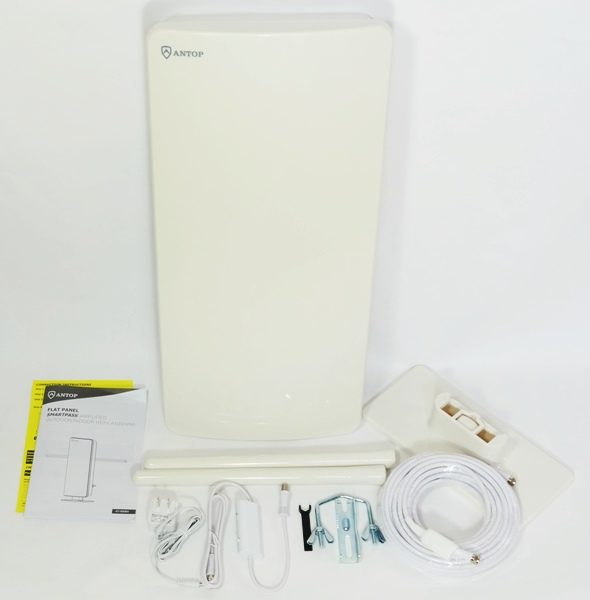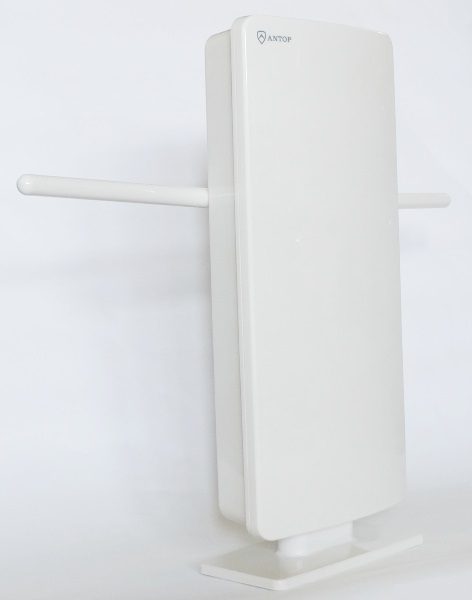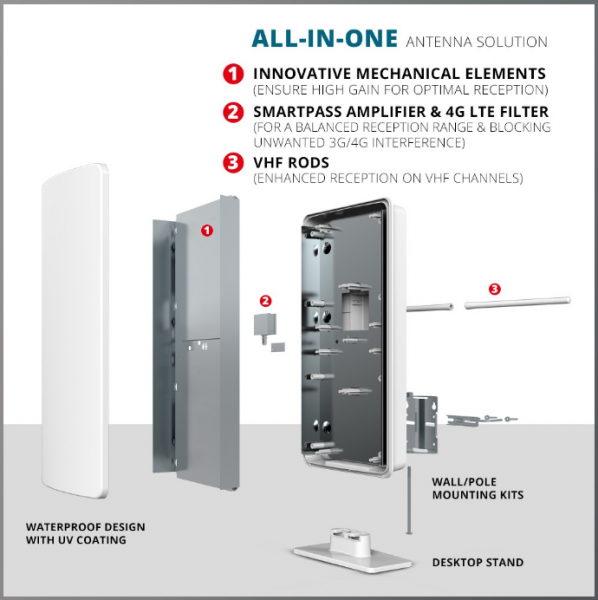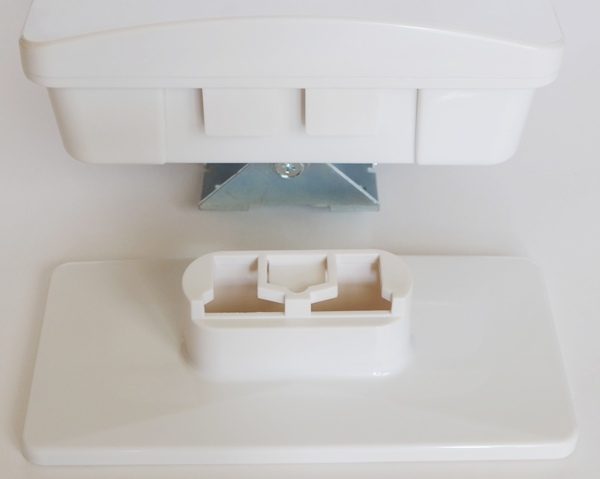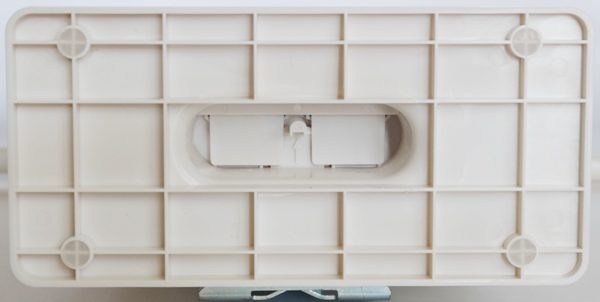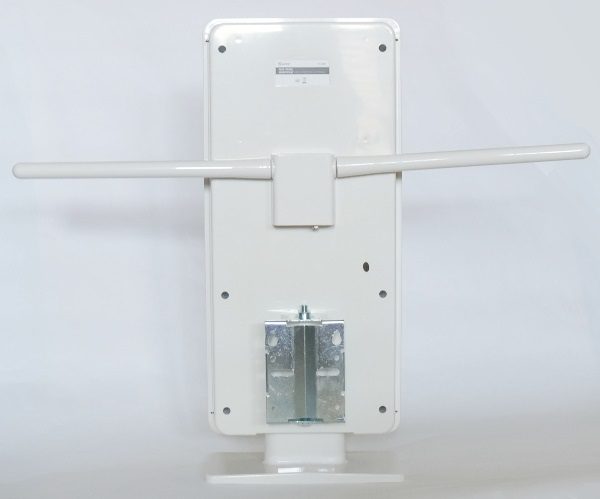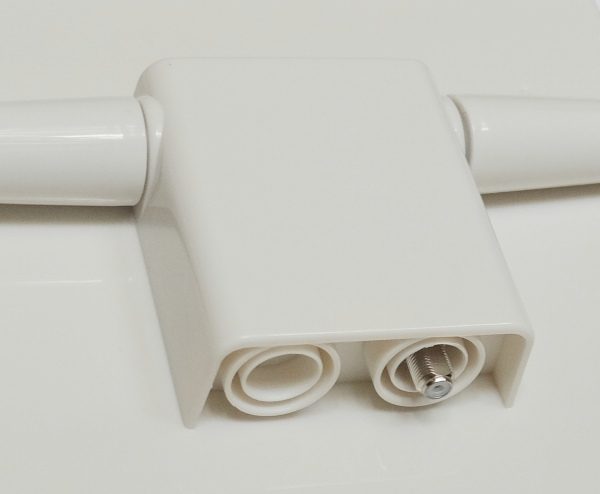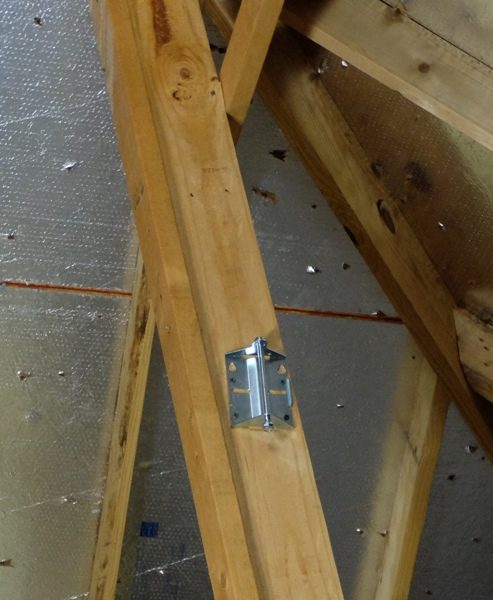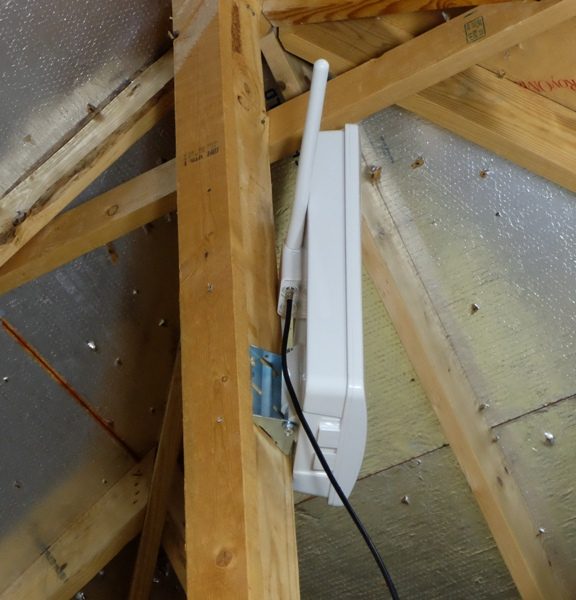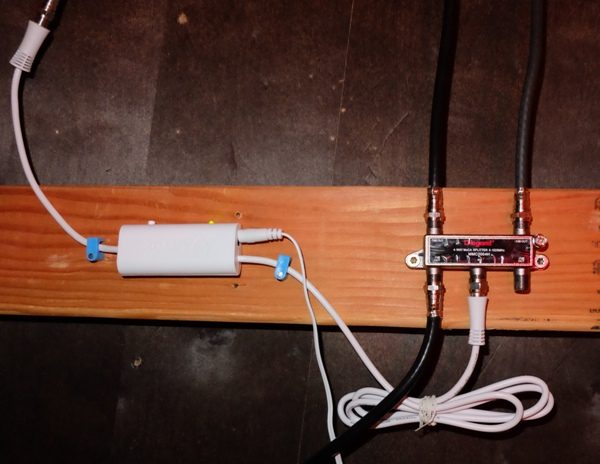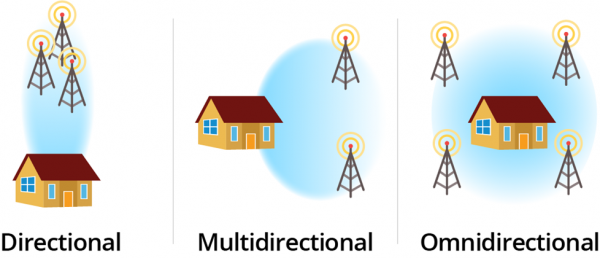Our family has been a part of the cord cutting trend for about 15 years now. I’ve tried a handful of flat indoor HDTV antennas in the past and have struggled to find just the right position to try to receive all of the channels that we like to watch. Once that hurdle had been leaped, they worked well for the most part, yet whenever a car drove by or there were any storms in the area, the reception on some channels would start to drop out. Are there others that work better? ANTOP offered the Gadgeteer indoor and outdoor antennas for review and I was eager to try them out to see how they would perform. I was sent the ANTOP Paper Thin Smartpass Amplified AT-125B Indoor HDTV antenna and the Flat Panel Smartpass Amplified AT-400BV Outdoor/Indoor HDTV antenna to test. In my testing, I found that it was difficult to find the optimal placement for the AT-125B Indoor antenna (just like my other indoor antennas) and found that it performed better in one room over another but not quite as well as our Clearstream Eclipse HDTV Amplified Indoor Antenna. On the other hand, when the AT-400BV Outdoor antenna (which can function as an antenna for all your TVs) was installed in our attic, it performed flawlessly. It was able to receive ALL my favorite channels without ANY issues and I even received a few stations that I could not tune in with indoor antennas.
ANTOP PAPER THIN SMARTPASS AMPLIFIED AT-125B INDOOR HDTV ANTENNA
Package Contents
- Omni-directional ANTOP Paper Thin SmartPass Amplified HDTV antenna (AT-125B)
- AC/DC power adapter for amplifier (amplifier’s power cord connects to power adapter via USB)
- Three double-sided application stickers
- Two double-sided application suction cups (for window mounting)
- Table stand
- User Manual
Technical Specifications
- Application: Indoor
- Amplification: Smartpass Amplified, balanced reception range
- Reception Pattern: 360-degrees omnidirectional
- Distance to transmitter: 40/55 mile
- Frequency Range: 47-230MHz, 470-700MHz
- Gain: 26dB Max
- Output Level: 100dBuV Max
- Noise Figure: ≤3dB
- Impedance: 75Ω
- Power Supply: DC 5V/50mA via USB cable
- Cable Length: 10ft integrated coaxial cable
- Color: Piano White
- Size: 13.7″ x 12.48″ x 0.02″
- 4G LTE Filter: Blocks unwanted 3G and 4G signals
- Suitable for home and RV use
- Online customer support, installation assistance
- 12-month warranty
Design & Build Quality
Both sides of the ANTOP Paper Thin SmartPass Amplified Indoor HDTV antenna were made out of shiny white plastic which shows fingerprints easily. The antenna has the Smartpass Amplifier already attached to it which, according to ANTOP, “uses an all-in-one design to allow an easier connection and deliver the correct balance between short and long range reception.” This omnidirectional antenna also has a built in filter to block 3G and 4G signals to prevent interference. It is very thin and about 13.7″ x 12.5″ x 0.02″ and has a 9’11” integrated coaxial cable (total length between antenna and TV).
The amplifier has a switch that allows you to turn the amplifier “On” (green light) or “Off” (yellow light). 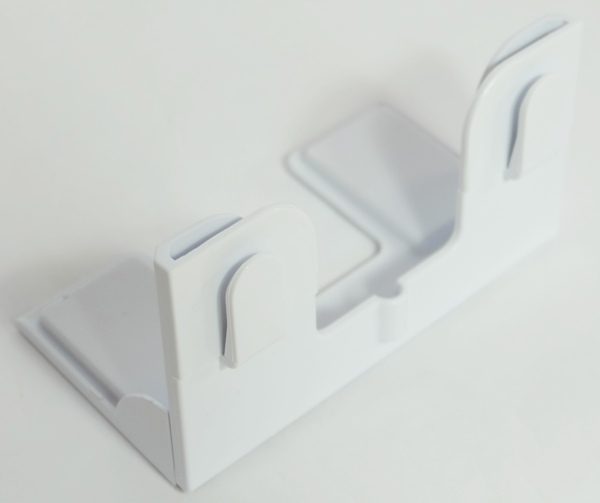
The antenna came with a tabletop stand.
This stand is nice just in case you find an optimal position on top of a desk, table, or bookshelf.
AT-125B Indoor Antenna Use
TV stations in the Fort Worth area: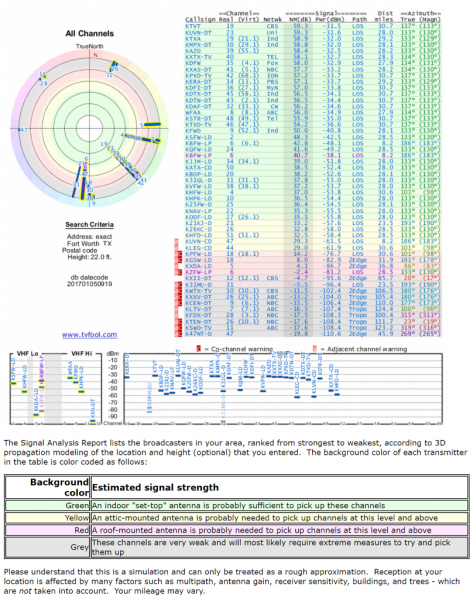
When I performed an internet search for TV stations available near me using TVFool.com, I input an antenna height of 22 ft. because I knew that I was installing the ANTOP outdoor antenna in the attic of our home and I wanted to find all of the towers that the outdoor, as well as indoor, antennas, might be able to detect. The above data shows where our TV towers are located in relation to where we live. The stations are color coded to indicate what type of antenna you would need to receive these channels (the image may be clicked on to view a larger image). The channels highlighted in green can be received with an indoor antenna and those highlighted in yellow can be received with an attic antenna. Those in red require a roof mounted antenna. This is a useful tool to figure out which type of antenna to choose.
This is the tower information that I found from another website, Over-the-Air Digital Television (otadtv.com). Each of the green rings represents 10 miles each, so you can see that most of the towers are about 30 miles away from us. In fact, the cluster of stations located in the southeast portion of the map are the only stations we receive. The other individual towers are the low powered towers of independent stations that we don’t pick up. This graphic also shows the terrain (the graph just below the map) between the channel 11 tower and our antenna (and would show the terrain between us and the other towers if the towers were selected).
The above list of stations is a small sample of the list of possible stations located near us. The nice thing about otadtv.com is that they provide the following list of information:
- a list of all the possible virtual channels we might receive (e.g. we receive the Daystar channel 2.1 and not the infomercial channel 2.1)
- radio frequency (RF) broadcast channel
- call sign
- subchannels
- the angle of the tower in relation to us (degrees off of true North)
- the range of the broadcast tower (miles)
- the signal (%) “… based on receiver dynamic range of -5dBm (maximum) to -65 dBm (minimum discernable signal)”
- the estimated signal power (dBm with respect to 1 milliwatt) – based on a receiving antenna 30 feet above ground level
- signal bars telling you how well you might be able to tune in that station
- RF Band
- Effective Radiated Power in kilowatts (ERP in kW)
- broadcast tower antenna elevation above Mean Sea Level (MSL).
Guest Room Reception: I first tried placing the ANTOP indoor antenna in the guest room. Indoor antenna setups are easy – you simply connect the end of the coax cable attached to the amplifier (which is attached to the antenna) to the TV, …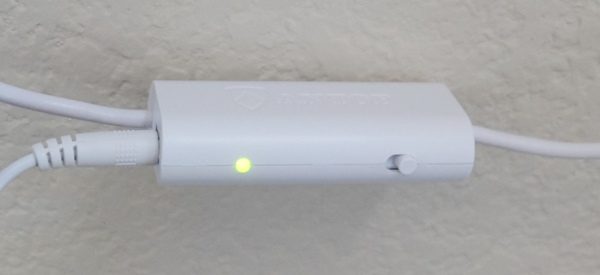
… plug in the amplifier and slide the switch over to turn on amplification (we need amplification here where I live but you may not), …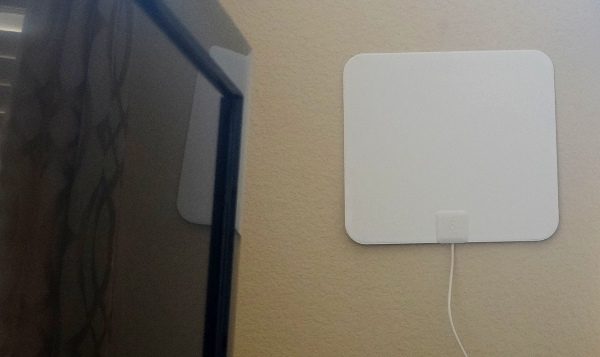
… then pray that you find the best position to receive all your favorite stations within the limited cable length provided by the ANTOP indoor antenna (9′ 11″ from the antenna to the TV). This was the position that tended to receive most channels in our guest room. 
Just after connecting the ANTOP indoor antenna to my TV, I went into the TV settings to scan for all the possible stations that came in using that placement. I then checked to see if all the major networks tune in and if my other favorite channels come in. It never works on the first try so I move the antenna and try it again. And again, And again. And again … (I’ve performed this repetitive process with every indoor antenna that I have tested; it’s something that I’ve come to expect with HDTV indoor antennas perhaps because of issues with the terrain, buildings, and distance between us and the towers). The antenna does have a 40/55 mile range and thus it should receive the channels from our TV towers located approximately 30 miles away. I found that in the guest room I received about 50 channels after the finding the best position.
The antenna struggled to tune in all of the channels detected by the channel scan using this antenna position (this was the best position). Whenever I was able to tune in ABC (channel 8.1 in Fort Worth), I had difficulty tuning in NBC (channel 5.1) and visa versa. However, this seems to be a consistent problem with other indoor antennas I’ve tried in this area of the house.
I also had some difficulty with tuning in FOX (channel 4.1), PBS (channel 13.1), and My27 (channel 27.1) although not all at once. Nighttime hours affected the reception, such that stations received during the day did not come in at night and visa versa. These are obviously important channels to me and thus this antenna did not work very well in the guest room.
Living Room Reception: When I placed this antenna in the living room where I was using my Clearstream Eclipse HDTV Amplified Indoor Antenna, the ANTOP antenna performed much better than it did in the guest room. I received 55 channels after performing the channel scan in this room which included all the channels I enjoy watching; however, I think the Clearstream antenna performed a little better – the Clearstream was better at tuning in ABC (I also prefer the Clearstream because it is smaller, has longer coax cable, and has a wonderful removable adhesive which makes positioning it easier). While in the living room, ABC (channel 8.1), channel 21 (KTXA) and ION (channel 68.1) had some pixelation show up during rainy weather using the ANTOP indoor antenna. These are important channels to me and so this was a little disappointing but not unexpected.
Conclusion about ANTOP AT-125B antenna: The ANTOP Paper Thin Smartpass Amplified AT-125B Indoor HDTV took patience to find the ideal placement in the guest room especially with such a limited length of coax cable (9’11”) that came with the antenna, but after doing so, I was able to tune in many of the TV stations, but had trouble tuning in stations like ABC, NBC, FOX, PBS and My27 using just one antenna position. When the antenna was placed in the living room it performed much better (there were some pixelation issues on important stations like ABC and ION during rainy weather) but not quite as well as the Clearstream Eclipse HDTV Amplified Indoor Antenna (the Clearstream is also smaller, has longer coax cable, and has removable adhesive which gives it an edge over other indoor antennas in my opinion).
There are factors that can make tuning in stations difficult. We live in a single family home in a crowded subdivision where the houses are very close together. And although it seems that our terrain here is rather flat, otadtv.com shows that there are some contours between me and the towers. So buildings, the surrounding terrain, weather, cars passing by the house, and even different rooms in our house may affect our reception using this antenna. I’m still on a quest to find an antenna that has no problems with these stations even when cars drive by, or during nighttime hours, or during inclement weather. I’ve been using HDTV indoor antennas for years, but how much better are whole-house attic antennas? Are they worth the extra cost?
FLAT PANEL SMARTPASS AMPLIFIED AT-400BV OUTDOOR/INDOOR HDTV ANTENNA
Package Contents
- Flat Panel Smartpass Amplified Outdoor/Indoor HDTV antenna (AT-400BV)
- Two plastic coated VHF enhancing rods
- Indoor Table Stand
- AC/DC Power Adapter
- Power Inserter with Smart Switch
- Wall/Pole Mounting Bracket
- 39 ft Coaxial Cable
- Instruction/User Manual
Technical Specifications
- Application: Indoor/Outdoor
- Amplification: Smartpass Amplified
- Reception Pattern: Multi-directional
- Distance to transmitter: 60/70 mile
- Frequency Range: 87.5-230MHz, 470-700MHz
- Gain: Switch-OFF: 10dB; Switch-ON: 33dB
- Output Level: 100dBuV Max
- Noise Figure: <3.5dB
- Impedance: 75Ω
- Power Supply: DC 12V via power adapter
- Cable Length: 39ft
- Color: White
- Size: 22″ x 10″ x 4.7″
- Operating Temperature: -40° F to 140° F
- Whole house solution: Can feed multiple TVs
- Enhancer Rods to strengthen VHF reception
- 4G LTE filter: Blocks unwanted 3G and 4G signals
- UV coating, weather resistant finish
- Easy home exterior installation: wall, roof, balcony (can be installed in attic and used on table too)
- Online customer support, installation assistance
- 12-month warranty
Design & Build Quality
The ANTOP Flat Panel Smartpass Amplified Outdoor/Indoor HDTV antenna (AT-400BV) is encased in rigid white plastic that has been UV coated and has a weather resistant finish. It is a large antenna measuring 22″ x 10″ x 4.7″. It comes with a Smartpass Amplifier and 4G filter for “balanced reception range and blocking unwanted 3G/4G interference”. It also has a white plastic indoor stand for occasions when you may want to set this antenna on a flat surface.
The stand slides onto the bottom of the antenna and clicks in place.
If you should need to remove the stand, you need to depress a small plastic peg located in the center of a hollow area under the stand (in the photo above, you would press the plastic peg up) to release the stand from the antenna.
The back of the antenna displays the metal mounting bracket. The mounting bracket projects out from the antenna and pivots side-to-side on a long screw. We used this bracket to attach the antenna to a column in our attic.
The side of the antenna is rather thick measuring almost five inches.
ANTOP provides VHF enhancing rods with the AT-400BV model to strengthen VHF signals. The rods screw onto the back of the antenna to a white plastic “box” area.
On the bottom of the white “box” area, is a place to attach the coaxial cable.
Installation
We chose to install the Flat Panel Smartpass Amplified AT-400BV Outdoor/Indoor HDTV antenna in the attic for several reasons. First, our roof line is very high and the attic is pretty open (they don’t use trusses in Texas). Also, all our coaxial lines are already in the attic, so it made connecting the antenna very easy. Thus it was a simpler installation compared to installing it outside attached to the roof where we would have had to pull new cable into the house. However, when considering installing the antenna in the attic, we became concerned about its operating temperature. Our attic can get up to 130° F (or hotter) in summer on a hot day (the day we installed this it was 125 degrees in the attic and 97 degrees outside). We contacted ANTOP and confirmed that the antenna is rated for an ambient temperature of up to 140° F, which is good even for Texas.
The first thing we needed to do before installing the ANTOP outdoor antenna was to take the metal mounting bracket off by unscrewing the bolt located on the underside of the antenna.
To install the antenna we used wood screws and attached the bracket onto one of the vertical attic columns (the highest location within the attic) on the side that would allow the antenna to be swiveled and pointed in the southeast direction toward the TV towers.
After attaching the bracket, we threaded the bolt back through the bracket and antenna, swiveled the antenna toward the cluster of TV towers located southeast of us, and then tightened the bolt holding the antenna in place.
We then screwed one end of the coaxial cable to the back of the antenna (we need a much greater length of cable than that provided by ANTOP, so what is shown here is our own coax).
We then screwed the other end to the female end of the cable attached to the power inserter (this looks like the indoor antenna amplifier; this setup is located in our attic as well). The other end of the power inserter was then screwed into the four-way splitter. The power inserter was then plugged into a nearby outlet (which needed to be installed).
It is important to note that we purchased the splitter at Lowe’s, but we were concerned about that fact that the ANTOP instructions stated that the splitter must be capable of “All-Port DC Power Passing”. The splitters we found at the local stores do not have this capability, however, we purchased and installed it anyway and it worked just fine. All-Port DC Power Passing is a feature that allows power to be transmitted back to the antenna. We confirmed with ANTOP that although the instructions stated that All-Port DC Power Passing was required, that was not actually the case for our application.
The black coax cables connected to the splitter as shown in the photo above lead to the coax ports in each room where we have TVs. The final step was to connect each of our three TVs to the antenna. This was accomplished using a short six-foot length of our own coax cables connecting the TVs to the coax ports in each room and voila! Let there be TV channels!!
AT-400BV Outdoor Antenna Use
The ANTOP Flat Panel Smartpass Amplified AT-400BV Outdoor/Indoor HDTV antenna is a multi-directional antenna. This type of antenna receives signals from multiple directions. The above graphic comes from Crutchfield and they suggest that “If the transmitters are positioned more than 20° apart, try a multi-directional antenna”. If they are less than 20° apart, then you can use a directional antenna. Because all of our TV towers are southeast of us, the multi-directional antenna was suitable for our purposes.
After performing channel scans for each of our three TVs, 80 channels were detected and each of them tuned in perfectly using this antenna unlike the 55 channels (or less) that we received when using an indoor antenna. Wow, wow, wow, wow, WOW!! Every channel came in crystal clear. ABC is often difficult for us to tune in using an indoor HDTV antenna but comes in beautifully using the ANTOP AT-400BV outdoor antenna. There were no pixelation issues that I have observed even in the middle of sometimes heavy rain (we have been experiencing the rain brought on by the outskirts of Hurricane Harvey). Cars driving by no longer affect the image clarity and because we have the antenna installed at a height of about 22 feet above ground level, we’ve decreased the number of structures between us and the towers. We even receive stations that I have never received with our indoor HDTV antennas.
Conclusion about ANTOP AT-400BV antenna: This is by far the best of all of the antennas that I have tried thus far and if I had realized that it would work so well, I would have skipped the hassles of indoor antennas (finding the optimal position, problems with cars driving by and interfering with reception, or problems with storms interfering with channel reception) and gone with the outdoor/attic antenna a long time ago. We had an attic antenna years ago when we lived in a rural area of Wisconsin and it didn’t work very well. Fast forward to our Texas years and my fears were that after plunking down $200 for the antenna and going to the trouble to install it, would it even work? Holy cow, it works spectacularly and for all three of our TVs!
Final Thoughts
After trying the ANTOP Paper Thin SmartPass Amplified HDTV antenna (AT-125B) and the Flat Panel Smartpass Amplified Outdoor/Indoor HDTV antenna (AT-400BV), there is just no question that I would pass over the indoor antenna for the outdoor one. The indoor antenna had a very short length of coax cable integrated into the antenna (9’11”) and I struggled to find a good position where it would receive the most channels available to it using a single antenna position in our guest room (which happens to be the room farthest away from the TV towers). While in this room, it struggled to tune in stations like ABC, NBC, FOX, PBS and My27 using just one antenna position. It worked best in our living room and received 55 channels after the channel scan but still had some pixelation issues on stations that I like to watch like ABC and ION while it was raining outside.
The outdoor antenna which was installed in our attic at a height of about 22 feet above ground level, received 80 channels on each of our TVs and each channel came in crystal clear even with cars passing by or when it rained. I was absolutely thrilled with the AT-400BV outdoor antenna. I had no issues with it and highly recommend it; however, it is important to mention that it is a multi-directional antenna (not omnidirectional) and that your experience with it may be drastically different based on your terrain, distance from the towers, interference from buildings, etc.
Source: The samples used in this review were provided by ANTOP. Please visit their website for more information on the ANTOP Paper Thin SmartPass Amplified HDTV antenna (AT-125B) or the Flat Panel Smartpass Amplified Outdoor/Indoor HDTV antenna (AT-400BV). Or visit Amazon to purchase the AT-125B for $51.80 or AT-400BV for $143.00.
Product Information
| Price: | $51.80 (AT-125B); $143.00 (AT-400BV) |
| Manufacturer: | ANTOP |
| Retailer: | Amazon |
| Pros: |
|
| Cons: |
|
Filed in categories: Reviews
Tagged: Antenna
ANTOP AT-125B Indoor Antenna and AT-400BV Indoor/Outdoor Antenna review originally appeared on The Gadgeteer on September 4, 2017 at 9:27 am.
Note: If you are subscribed to this feed through FeedBurner, please switch to our native feed URL http://the-gadgeteer.com/feed/ in order to ensure continuous delivery.

